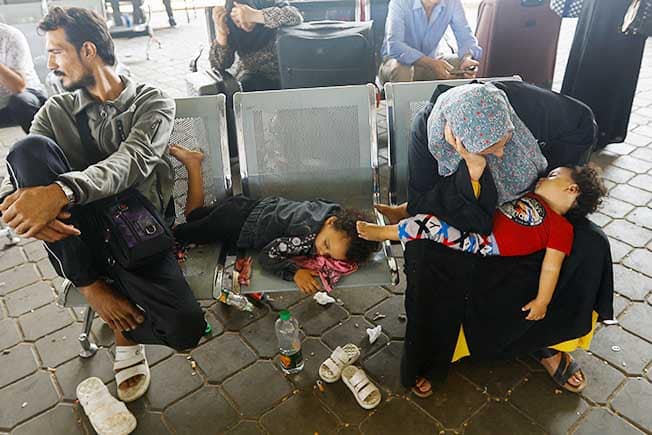People hoping to leave the Gaza Strip converged on the Rafah crossing to Egypt on Thursday, with those whose names were on an official list gradually passing through while others held up their foreign passports in vain.
The crossing was open for limited evacuations for a second day under a Qatar-brokered deal between Israel, Egypt, Hamas and the United States, aimed at letting some foreign passport holders and their dependents, and some wounded Gazans, out of the besieged enclave.
The desperation to escape from the densely populated territory, which has been under a total blockade and continuous Israeli bombardment for almost four weeks, was plain to see on the faces of those who were not authorised to cross to Egypt.
Among them was Ghada el-Saka, an Egyptian national who was visiting relatives in Gaza when the war started and the crossing was closed. She wept and cried out in frustration as she waited in a holding area on the Gaza side of the Rafah crossing with her daughter, holding up her Egyptian passport.
“Why are you doing this to us? Why are you leaving us in this destruction? We’ve seen death with our own eyes,” she said, her voice rising with emotion as tears streamed down her face.
Saka said she had been staying with siblings but the house had been damaged by an Israeli strike that hit a nearby house, and she and her daughter had been living on the street.
“I want to pass. We are not animals. I have Egyptian rights, we are Egyptian,” she said, adding that her other children were in Egypt. Her daughter cried as she sat next to her.
On the Gaza side of the crossing exhausted people slumped on chairs, some with their heads between their knees. Children slept, including one who had a small toy horse with broken legs next to him.
ON THE LIST
The Palestinian border authority published what appeared to be a list of those approved to leave on Thursday. It included 596 names, classified by country.
There were 15 countries in total. Those with the largest number of names on the list were the United States with 400, Belgium with 50, Greece, 24, Croatia, 23, the Netherlands, 20, and Sri Lanka, 17.
For those on the list, the evacuation process appeared orderly, with a series of checks on both sides of the Rafah crossing, and the relief was palpable.
“I want to say that what is aired on TV is just 5% of what we go through in reality,” said Shams Shaath, a U.S. passport holder whose name appeared on the list.
“We’ve seen people displaced, children who lost their parents, burnt and decapitated bodies. I’m one of the people who lost their houses,” he said.
Two Egyptian security sources, including one at the Rafah crossing, said about 400 people had arrived on the Egyptian side by 1000 GMT.
Egypt’s foreign ministry said nearly 7,000 people holding nationalities of more than 60 countries were expected to leave. Diplomatic sources said the process may take up to two weeks.
Different figures circulated as to how many had left on Wednesday. The Palestinian border authority said 345 people had crossed, while an Egyptian border source said 361 foreign passport holders and 46 injured.
The latest war in the decades-old conflict began when Hamas fighters broke through Gaza’s border with Israel on Oct. 7. Israel says they killed 1,400 people, mostly civilians, and took more than 200 hostages in the deadliest day of its 75-year history.
Israel’s ensuing bombardment of the small Palestinian enclave of 2.3 million people has killed at least 9,061 people, including 3,760 children, according to health authorities in Gaza, which is run by Hamas.
Harrowing images of bodies in the rubble and hellish conditions inside Gaza have triggered appeals for restraint and street protests around the world.







Click here to change your cookie preferences